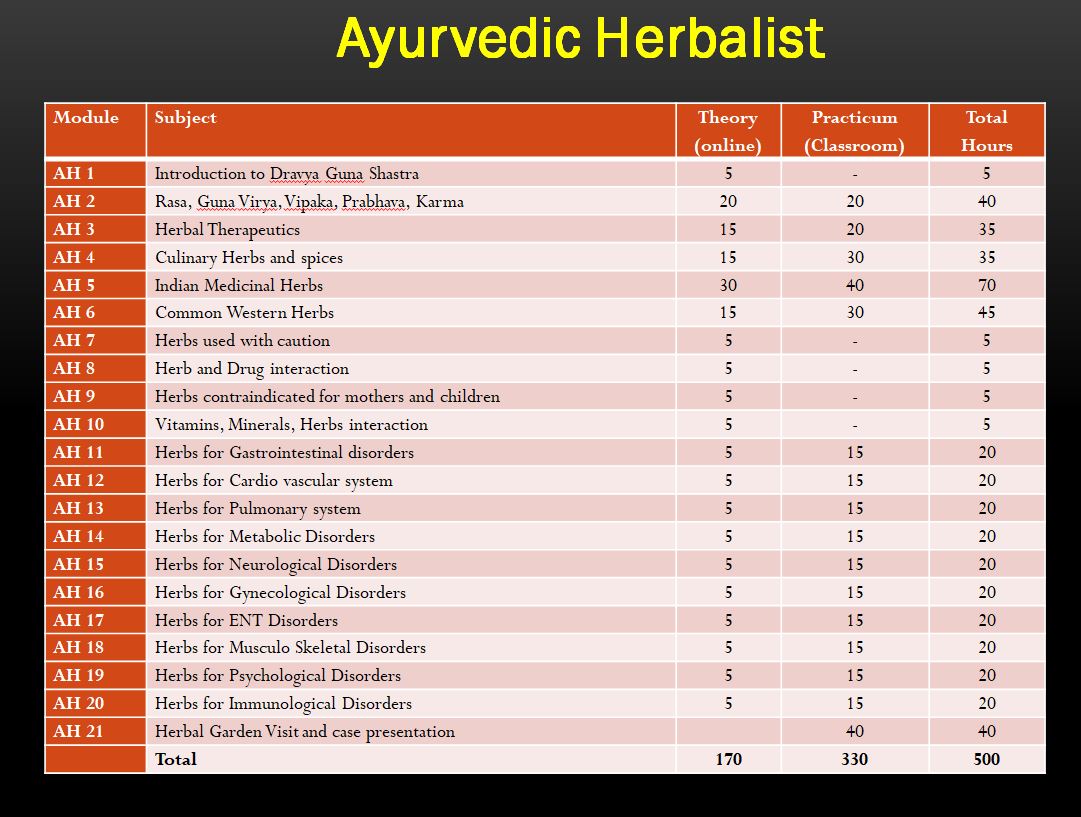Ayurvedic Herbalist Training
Online Webinar Faculty Members
Course Outlines
Global Ayurveda Academy is working to establish an Ayurvedic Hebalist Certification Program (Dravya Guna Shastra) as a 500-hour training program.
This training program is based on the guidelines of the World Health Organization (WHO) Benchmarks for training in traditional / complementary and alternative medicine: benchmarks for training in Ayurveda & Government of India, Ministry of Health & Family Welfare, Department of Ayurveda, Yoga, Naturopathy, Unani, Siddha and Homeopathy (AYUSH), New Delhi, India. (Reference Number: D.O. NO. 480 /Adviser (Ayurveda) / 2009, May 1st, 2009), and is approved by Association of Ayurvedic Professionals of North America (AAPNA), Inc.
Syllabus: (According to Central Council of Indian Medicine, AYUSH, Government of India)
Commonly used herbs in ayurveda:
This training program is based on the guidelines of the World Health Organization (WHO) Benchmarks for training in traditional / complementary and alternative medicine: benchmarks for training in Ayurveda & Government of India, Ministry of Health & Family Welfare, Department of Ayurveda, Yoga, Naturopathy, Unani, Siddha and Homeopathy (AYUSH), New Delhi, India. (Reference Number: D.O. NO. 480 /Adviser (Ayurveda) / 2009, May 1st, 2009), and is approved by Association of Ayurvedic Professionals of North America (AAPNA), Inc.
Syllabus: (According to Central Council of Indian Medicine, AYUSH, Government of India)
- Introduction to Dravya Guna Shastra
- Herbology East and West
- The manifestation of consciousness into plants
- Background of ayurvedic medicine
- Spiritual background
- Three Gunas
- Five Elements
- Three Doshas
- Seven Dhatus
- Ojas
- Five Pranas
- Srotas (bodily systems)
- Agni and plants
- Concept of Dravya
- Concept of Guna
- Concept of Rasa
- Concept of Vipaka
- Concept of Virya
- Concept of Prabhava
- Relationship of Rasaadi Gunas (Rasa Panchaka)
- Concept of Karma
- Description of six tastes
- Management of individual constitutions (dosha)
- Management of Vata
- Management of Pitta
- Management of Kapha
- Detoxification / Management of Aama
- Herbal Therapeutics:
- Alternative herbs (Rakta Shodhana karma)
- Ant parasitical and anthelmintic herbs (Krimghna karma)
- Astringent herbs (Sthambhana karma)
- Bitter tonic and antipyretic herbs
- Carminative herbs (Vata anulomana)
- Diaphoretic herbs (Swedana karma)
- Diuretic herbs (Mutrala karma)
- Expectorant and demulcent herbs (Kaasa – Swasahara)
- Laxative and purgetic herbs
- Nervine herbs
- Anti-spasmoic herbs
- Stimulant herbs
- Digestive herbs
- Tonics
- Botanical classification and different groups of herbs used in ayurveda
- Nomenclature, soil types, collection of herbs, preservation methods and measurements
- Impurities in herbs and their purification methods
- Ideal herb: Parts used, herb combinations, incompatible herbs, posology, anupana (vehicle), times of herb administration, routes of herb administration and recommendation of herbs
- Brief history of Dravya Guna in Vedas and Samhitas
- Knowledge about various Nighantus and their authors, Dravya Guna books by modern authors
Commonly used herbs in ayurveda:
- Agaru
- Agnimandha
- Ahiphena
- Ajamoda
- Amalaki
- Apamarga
- Aparajita
- Aragvadha
- Ardhraka
- Arjuna
- Arka Dwaya
- Ashoka
- Ashwagandha
- Ativisha
- Bakuchi
- Bala Dwaya
- Bhallataka
- Bhanga
- Bharangi
- Bhringaraja
- Bilva
- Brahmi
- Brihati
- Chandana
- Changeri
- Chitraka
- Dadima
- Dalchini
- Danti Moola
- Daru Haridra
- Devadaru
- Dhanyaka
- Dhataki Pushpa
- Dhattura
- Drona Pushpi
- Ela Dwayam
- Eranda
- Gambhari
- Gandha Parasarini
- Ghrita Kumari
- Gokshura
- Guduchi
- Guggulu
- Haridra
- Haritaki
- Hingu
- Indravaruni
- Jambu
- Jatamansi
- Jatiphala
- Jiraka
- Jyotishmati
- Kanchanara
- Kantakari
- Kapikacchu
- Karanja
- Karaveera
- Karpoora
- Kartaka Sringi
- Katuki
- Khadira
- Kirata Tikta
- Krishna Jiraka
- Kupeelu
- Kushmanda
- Kushta
- Kutaja
- Lata Karanja
- Lavanga
- Lodhra
- Madanaphala
- Manduka Parni
- Manjishta
- Maricha
- Misreya
- Mustaka
- Naga Bala
- Naga Kesara
- Nimba
- Nimbuka
- Nirgundi
- Palandu
- Palasa
- Paraseeka Yavani
- Patala
- Patha
- Patola
- Pippali
- Pippali Moolam
- Prsni Parni
- Punarnava
- Pushkara mula
- Rasona
- Saala
- Sali Parni
- Salmali
- Sankhapushpi
- Sapta parna
- Sarapunkha
- Sariva Dwaya
- Sarpagandha
- Satapushpa
- Satavari
- Sigru
- Sirisha
- Syonaka
- Talisa Patra
- Tejohva
- Trivrit
- Tulasi
- Tuvaraka
- Udumbara
- Usira
- Vacha
- Varuna
- Vasa
- Vatsanabhi
- Vibhitaki
- Vidanga
- Yasti Madhu
- Yavani
- Yavasa
- Aloe
- Barberry
- Basil
- Bayberry
- Burdock
- Cayenne pepper
- Chamomile
- Comfrey
- Dandelion
- Echinacea
- Elecampane
- Flax seed
- Gentian
- Golden seal
- Hawthorn berries
- Hibiscus flowers
- Horsetail
- Irish Moss
- Juniper berries
- Marshmallow
- Mint
- Mug wort
- Mullein
- Myrrh
- Nutmeg
- Parsley
- Penny royal
- Pomegranate
- Poppy seeds
- Prickly ash
- Psyllium husk
- Raspberry
- Red clover
- Rhubarb
- Rose flowers
- Saffron
- Sage
- Sarsaparilla
- Senna
- Skullcap
- Slippery elm
- Solomon’s seal
- Valerian
- Wild cherry bark
- Yarrow
- Yellow dock
- Herbs to be used with caution
- Due to potential allergic response
- Due to potential photo sensitizing effect
- Due to local irritant effect when fresh
- In acute inflammation of the urinary tract
- In gastrointestinal irritation
- In hypothyroid conditions or eu-thyroid goiter
- Dye to potential adverse effects
- Herb / Drug interactions
- Modifying intestinal absorption of medicines
- Potentiating cardio tonic medicines
- Potentiating sedative or tranquilizing medicines
- Modifying blood sugar in insulin dependent diabetics
- Modifying the effects of anticoagulants
- Concerning incompatible gastrointestinal tract medications
- Modifying enzyme activities in metabolic conversions
- Herbs contraindicated for mothers and children
- During pregnancy
- While breast feeding
- In children
- Vitamin / mineral / drug interactions
- Drug and mineral interactions with vitamin supplements
- Drug and vitamin interactions with mineral supplements
- A.P. Deshpande, PhD, and Subhash Ranade, PhD, Dravyaguna Vigyna Volume 1 & 2
- J.L.N. Sastry, BAMS, MD (Ayurveda), PhD (Ayurveda) - Dravyaguna Vijnana, Chaukhambha Orientalia, Volumes I – IV, Varanasi, India 2007
- David Frawley & Vasant Lad, BAMS, MAMS – The Yoga of Herbs, Lotus Press, Santa Fe, NM, USA 1996
- Francis Brinker, ND, Herb contraindications & Drug interactions, Eclectic Medical Publications, Oregon, USA 2001
- Bharat B. Aggarwal, PhD – Healing Spices, Sterling Publishing, New York, USA 2011
- Quick Access – Professional Guide to Conditions, Herbs & Supplements, Integrative Medicine Communications, Newton, MA 2000
- Vaidya V.M.Gogte, Ayurvedic Pharmacology & Therapeutic uses of medicinal plants, Bharatiya Vidya Bhavan, Mumbai, India 2000
- Prof. K.R. Srikantha Murthy, Bhavaprakash of Bhavamisra Volume 1 & 2, Chowkhamba Krishnadas Academy, Varanasi, India 2004

